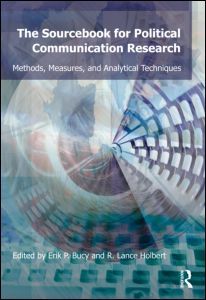Sourcebook for Political Communication Research Methods, Measures, and Analytical Techniques Routledge Communication Series
Coordonnateurs : Bucy Erik P., Holbert R. Lance

The Sourcebook for Political Communication Research will offer scholars, students, researchers, and other interested readers a comprehensive source for state-of-the-art/field research methods, measures, and analytical techniques in the field of political communication.
The need for this Sourcebook stems from recent innovations in political communication involving the use of advanced statistical techniques, innovative conceptual frameworks, the rise of digital media as both a means by which to disseminate and study political communication, and methods recently adapted from other disciplines, particularly psychology, sociology, and neuroscience. Chapters will have a social-scientific orientation and will explain new methodologies and measures applicable to questions regarding media, politics, and civic life. The Sourcebook covers the major analytical techniques used in political communication research, including surveys (both original data collections and secondary analyses), experiments, content analysis, discourse analysis (focus groups and textual analysis), network and deliberation analysis, comparative study designs, statistical analysis, and measurement issues.
Introduction
- Advancing Methods and Measurement: Supporting Theory and Keeping Pace with the Modern Political Environment
- Challenges and Opportunities of Panel Designs
- The Rolling Cross-Section: Design and Utility for Political Research
- Political Communication Survey Research: Challenges, Trends, Opportunities
- Secondary Analysis In Political Communication Viewed as Creative Act
- Comparing the ANES and NAES for Political Communication Research
- The Implications and Consequences of Using Meta-Analysis for Political Communication
- Experimental Designs for Political Communication Research: Using New Technology and Online Participant Pools to Overcome the Problem of Generalizability
- Expressing versus Revealing Preferences in Experimental Research
- The Face as a Focus of Political Communication: Evolutionary Perspectives, Experimental Methods, and the Ethological Approach
- Multi-Stage Experimental Designs in Political Communication Research
- Image Bite Analysis of Political Visuals
- Identifying Frames in Political News
- Content Analysis in Political Communication
- The Uses of Focus Groups in Political Communication Research
- Genealogy of Myth in Presidential Rhetoric
- Methods for Analyzing and Measuring Group Deliberation
- Porous Networks and Overlapping Contexts: Methodological Challenges in the Study of Social Communication and Political Behavior
- Mediatization of Politics: Toward a Conceptual Framework for Comparative Research
- International Applications of the Agenda-Setting Acapulco Typology
- Political Communication Across the World: Methodological Issues Involved in International Comparisons
- Expanding the Use of Structural Equation Modeling (SEM) in Political Communication
- Mediation and the Estimation of Indirect Effects in Political Communication Research
- Time-Series Analysis and the Study of Political Communication
- Concept Explication in the Internet Age: The Case of Interactivity
- Beyond Self-Report: Using Latency Measures to Model the Question Answering Process on Web-Based Public Opinion Surveys
- What the Body Can Tell Us About Politics: The Use of Psychophysiological Measures in Political Communication Research
- Looking Back and Looking Forward: Observations on a Rapidly Evolving Field
Survey Methodology
Secondary Analysis and Meta Analysis
Experimental Methods
Content Analysis
Discourse Analysis
Network and Deliberation Analysis
Comparative Political Communication
Statistical Techniques
Measurement
Conclusion
Erik P. Bucy (PhD, University of Maryland, College Park, 1998) is an Associate Professor of Telecommunications and Adjunct Associate Professor in the Department of Political Science and School of Informatics at Indiana University, Bloomington. Bucy is the editor of Politics and the Life Sciences, and author, with Maria Grabe, of Image Bite Politics: News and the Visual Framing of Elections (Oxford, 2009). Bucy serves on the editorial boards of Human Communication Research, The Information Society, and Mass Communication and Society. He has held visiting and research appointments at the University of Michigan and Dartmouth College.
R. Lance Holbert (PhD, University of Wisconsin-Madison, 2000) is an Associate Professor in the School of Communication at The Ohio State University. He is the author of several articles on the use of structural equation modeling in the communication sciences. His most recent research has appeared in Journal of Communication, Communication Research, Communication Monographs, and Media Psychology. He serves on many editorial boards, including Journal of Communication, Communication Monographs, and the Journal of Broadcasting & Electronic Media.
Date de parution : 04-2013
Ouvrage de 608 p.
17.4x24.6 cm
Disponible chez l'éditeur (délai d'approvisionnement : 14 jours).
Prix indicatif 93,24 €
Ajouter au panierThèmes de Sourcebook for Political Communication Research :
Mots-clés :
Political Communication Research; Political Communication Scholars; political communication; Political Communication Researchers; Erik Bucy; Annenberg Public Policy Center; Lance Holbert; Self-reported Media Exposure; political research methods; Negative Political Advertising; political science research; Social Desirability Biasing; comparative political communication research; Time Series Analysis; content analysis; Restricted Factor Analysis; survey methodology; Secondary Analysis; political communication research measurement; Computer Content Analysis; NAES; Behavioral Intent; Panel Design; RCS; Random Assignment; TESS; Vice Versa; Political Knowledge; Ane; Social Communication Research; News Media Logic; Deliberative Poll; Silent Bared Teeth Display; Van Hooff



